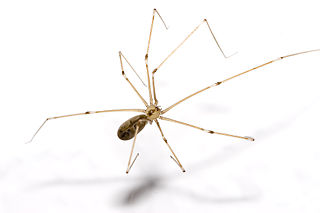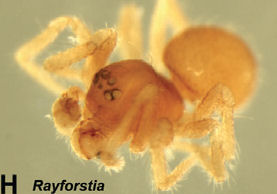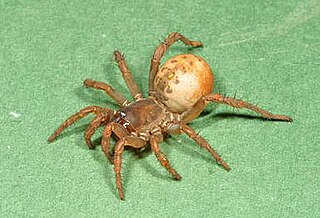
The Pholcidae are a family of araneomorph spiders. The family contains more than 1,800 individual species of pholcids, including those commonly known as cellar spider, daddy long-legs spider, carpenter spider, daddy long-legger, vibrating spider, gyrating spider, long daddy, skull spider, and angel spider. The family, first described by Carl Ludwig Koch in 1850, is divided into 94 genera.
Heliophanus lesserti is a jumping spider species in the genus Heliophanus. It was first described by Wanda Wesołowska in 1986 and lives in Central and Southern Africa. Fitting with the arachnid classification, the spider's body features consists of a front cephalothorax and a back abdomen. The Heliophanus lesserti jumping spider has a primarily black colored body with light yellow and gold accents. The front legs are notability thicker than the rest while the back four having light yellow details. The part of the back abdomen that is attached to the cephalothorax has a light yellow coloring surrounding the edge.
Austrarchaea clyneae is a species of spider in the family Archaeidae. It is endemic to Australia. The etymology behind the species name comes from Australian naturalist and photographer Densey Clyne, who served as a great inspiration in the early life of Mark Stephen Harvey, who was responsible for finding and naming the species.
Coscinida propinqua is a species of comb-footed spider in the family Theridiidae. It is found in Angola.

Cosmophasis gemmans is a species of jumping spider in the family Salticidae. Only the male has been described. The type specimen is deposited at the Museo Civico di Storia Naturale di Genova. These spiders are typically found on the Indonesian island of Sumatra.
Phoneutria depilata is a species of spider in the family Ctenidae, found in Central America.

Thelcticopis kirankhalapi is a species of huntsman spider endemic to India.

Tangata rakiura is a species of araneomorph spider of the genus Tangata. The species is endemic to New Zealand

Ascuta australis is a species of Orsolobidae spider of the genus Ascuta. The species is endemic to New Zealand

The white-winged orbweaver is a small orbweaver that was first described in the year 1887 by Eugen von Keyserling. These spiders were previously known as Araneus parvulus and Eriophora parvulus before they got their current scientific name.

Heliophanus kochii is a jumping spider species in the genus Heliophanus. It was described by Eugène Simon in 1868.
Rayforstia mcfarlanei is a species of Anapidae that is endemic to New Zealand.
Rayforstia salmoni is a species of Anapidae that is endemic to New Zealand. The species was first described by Ray Forster in 1959.
Rayforstia plebeia is a species of Anapidae that is endemic to New Zealand. The species was first described by Ray Forster in 1959.

Rayforstia vulgaris is a species of Anapidae that is endemic to New Zealand. The species was first described by Ray Forster in 1959. It is also the type species for the genus Rayforstia.
Rayforstia scuta is a species of Anapidae that is endemic to New Zealand.

Rayforstia wisei is a species of Anapidae that is endemic to New Zealand.
Rayforstia raveni is a species of Anapidae that is endemic to New Zealand. The species was first described by Michael G. Rix and Mark Harvey in 2010.

Ryuthela saskii is a species of spider in the genus Ryuthela. The species is endemic to the Ryukyu Islands in Japan.









